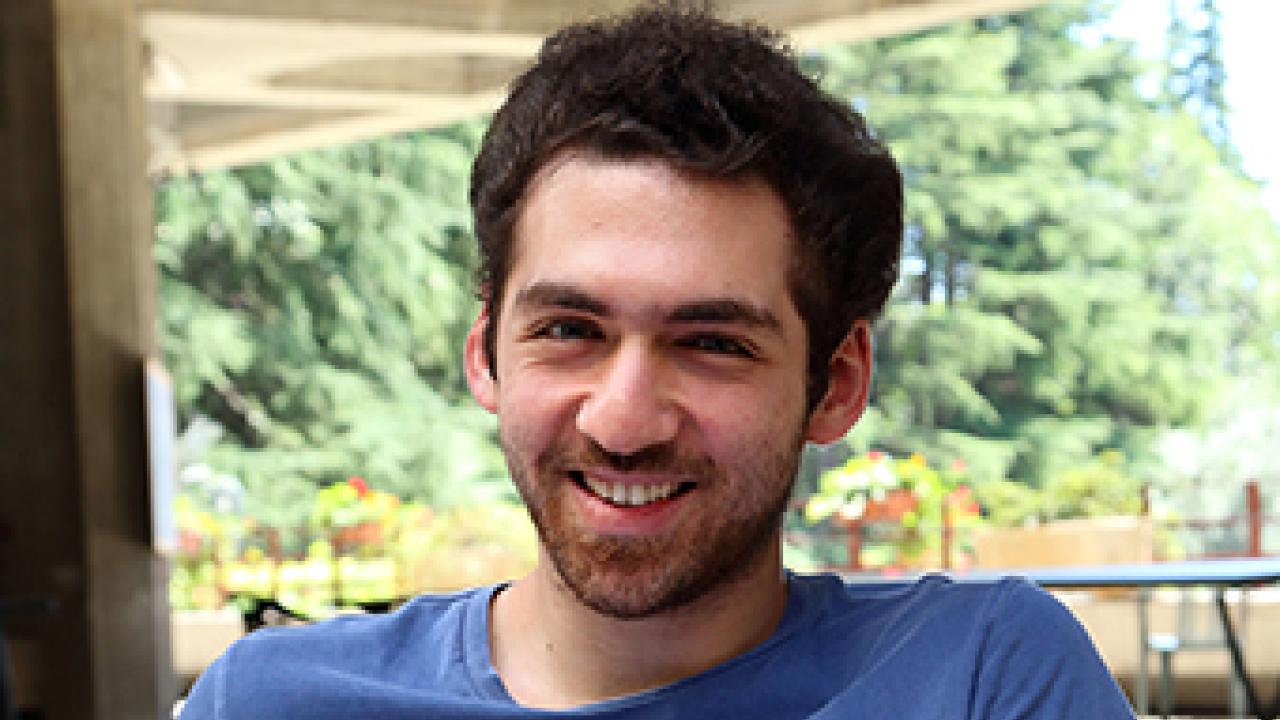
Asked where he sees himself in 10 years, Ali Rida Khalife is quite honest: "Before ICTP I was thinking of staying in the US or Europe, doing research and getting a Nobel Prize or something," he laughs. "But after ICTP I think I have a duty to help my country, to motivate and support science there."
ICTP is happy to support Khalife as he works toward this goal, first as a 2015-2016 Diploma student in high energy physics, and now as a freshly accepted student in the Joint ICTP-SISSA PhD Program. To fulfill the requirements of the Diploma program, Khalife completed a thesis that investigated how gravity affects particles on a fundamental level, using a very simple model. A way to unify gravity with the interactions of other physical phenomena has continually eluded physicists, explains Khalife; the simple model gives a taste of the problem in the short two months Diploma students have for their theses. This may or may not develop into part of Khalife's PhD project: he's interested in diving deeper into early cosmology and fundamental questions of the origins of everything.
A fascination with those origins is a big part of why Khalife became a scientist. As a child in Lebanon, he always liked watching Dexter's Laboratory, an animated sci-fi series about a boy genius with a secret lab behind his bookcase. That early interest in science was waylaid by peer pressure for a while, as he joined his friends with an interest in engineering, before his father suggested trying physics at university.
"There, I took a course with a crazy professor," Khalife says. "I couldn't understand a thing he was saying, but at the end of each line he would say, 'and you get a planet!' or, 'and you get a human being!' He presented all these physics ideas as really fundamental to life. Where did everything come from in the beginning? This is a question that I am always trying to ask and answer myself, because I think it's very interesting to know how everything came into origin."
Khalife did his undergraduate studies and master's degree at the American University of Beirut after completing high school in Qatar, where his family moved after the 2006 war in Lebanon. War is only one of the barriers for the scientific community in Lebanon, but fortunately, recent years have seen the Lebanese government increase their investment in and support of science. Lebanon formally joined the huge international physics collaboration that is CERN in December 2015, and there have been recent introductions of new funding mechanisms, programs and government strategies for supporting science. Lebanon's network of universities, although well established, lacks research institutes. At the moment, few professors conduct original research or publish in international peer-reviewed journals. "Most people in Lebanon think that if you are a scientist, you are going to teach at a high school or a university, and that's it—they don't think about the research part," says Khalife.
Lebanon has one of the highest GDP per capita in the region as well as one of the highest government expenditures on education. However, politics in the country and region are both delicate and complex, especially since war in Syria has prompted a massive influx of refugees to Lebanon. While the country has plenty of students interested in higher study, politics and uncertainty means growth is unsteady and jobs for graduates are hard to find. "It's almost impossible to find a decent job without having some connections, without knowing someone," Khalife says. While there's a lot of uncertainty, the environment for research and scientists in Lebanon seems to be improving, especially as the government recognizes science and technology as drivers of economic growth. For Khalife, the general view of science needs to change as well. "That's the main problem: society is not accepting of the idea that we need scientists and basic research, that it's useful for the future."
Starting close to home, Khalife's family is quite supportive and encouraging of his studies. "They always say, keep on going, you're going to be the first scientist in the family," Khalife smiles. "My cousins, my aunts and uncles, they are also interested in this big question, the origins of everything. From a life point of view, studying back in Lebanon was definitely more relaxing for me, because I had the support of my family and friends."
From an academic point of view, Khalife appreciates the intensity of the Diploma Program, and the seriousness of the environment at ICTP. "For my master's, the environment wasn't very serious, and there were not very many of us in each specialty." Here, with more scientists in high energy and cosmology at every level of their studies, the conversations about the science are much more varied and stimulating, says Khalife. The Diploma program is also very demanding, requiring intense study. "Here we really didn't have time to do much besides study," Khalife smiles. "As soon as my thesis is submitted, I have a wish list of exploring to do with other Diploma students before we all leave."
While Khalife is studying for the next several years, ICTP hopes to continue seeing and supporting the growth of science in Lebanon. Wherever Khalife settles for his scientific career, with luck there will be a way to win a Nobel Prize as well as advance science in Lebanon.
--Kelsey Calhoun













